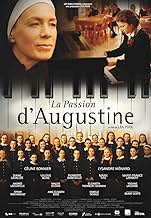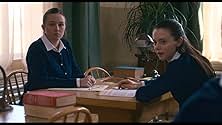Füge eine Handlung in deiner Sprache hinzuIn a small convent school in rural Quebec, Mother Augustine provides a musical education to young women no matter their socio-economic background. However, with the looming changes brought b... Alles lesenIn a small convent school in rural Quebec, Mother Augustine provides a musical education to young women no matter their socio-economic background. However, with the looming changes brought by Vatican II and Quebec's Quiet Revolution, the school's future is at peril.In a small convent school in rural Quebec, Mother Augustine provides a musical education to young women no matter their socio-economic background. However, with the looming changes brought by Vatican II and Quebec's Quiet Revolution, the school's future is at peril.
- Auszeichnungen
- 15 Gewinne & 8 Nominierungen insgesamt
Empfohlene Bewertungen
Mother Augustine runs a small convent school in Quebec that emphasizes music instruction, particularly piano. It's the 1960s and the world is rapidly changing. Vatican II has shaken the Catholic world like a major earthquake, Quebec's Quiet Revolution is threatening to take away the control of the schools from the Catholic Church, and there is not enough money to keep all the convent schools open.
Mother Augustine is confident, though, her school will not be closed, and it will continue to provide a superior education to the girls both in academics and music. Parents who have more money than others subsidize the education of the less fortunate students. One student, whose mother cannot currently pay tuition, is Mother Augustine's niece. Her sister suddenly shows up one day and drops her off, giving a reason that was not true.
Her niece Alice does not want to be there and has some problems adjusting. This is not a nun movie about the hijinks of convent school girls, however, and there are no "mean girls". It's also not the type of nun movie where the viewer is likely to feel any intense feelings for the nuns, good or bad. It was hard not to be deeply moved, though, by the fears and tears of the nuns when they had to remove their habits, and put on the more modern clothes now required of them. Without the veil and coif, the difference in their appearances was astounding.
The film also briefly touches on the topics of lower pay for women in Quebec, including nuns, and on reproduction rights. Times were truly changing in the 1960s. Would Mother Augustine's school survive? Would she and the other nuns be able to adjust to all the changes dictated by Vatican II? Would music and the other liberal arts still be considered important when all was said and done? Lots of questions and lots of beautiful scenery in this movie.
The two leads are incredible. Celine Bonnier is the mother superior, Sister Augustine and Lysandre Menard, her niece and student. The girl is a piano prodigy but a little too headstrong for the rules of the Catholic convent music school in the midst of the turbulence of Vatican II.
I was about eight when the Mass transitioned from Latin to English and nuns shed their habits for civilian attire. It was a shattering experience for many of the older sisters.
The movie is in French and so the subtitles were a necessity for this American viewer. Please do not miss this amazing film.
Also wish to thank Céline Bonnier for her beautiful and sensitive act in the film, to Léa Pool for her extraordinary direction and Daniel Jobin for the stunning camera angles.
It is not easy to find this film, so if you have a chance to see it, you are a very lucky person.
Wusstest du schon
- VerbindungenFeatured in 2016 Canadian Screen Awards (2016)
- SoundtracksAve Verum Corpus
Composed by Wolfgang Amadeus Mozart
Top-Auswahl
Details
- Erscheinungsdatum
- Herkunftsland
- Offizielle Standorte
- Sprache
- Auch bekannt als
- The Passion of Augustine
- Drehorte
- Produktionsfirmen
- Weitere beteiligte Unternehmen bei IMDbPro anzeigen
Box Office
- Budget
- 4.700.000 CA$ (geschätzt)
- Weltweiter Bruttoertrag
- 133.929 $
- Laufzeit1 Stunde 43 Minuten
- Farbe
Zu dieser Seite beitragen





































